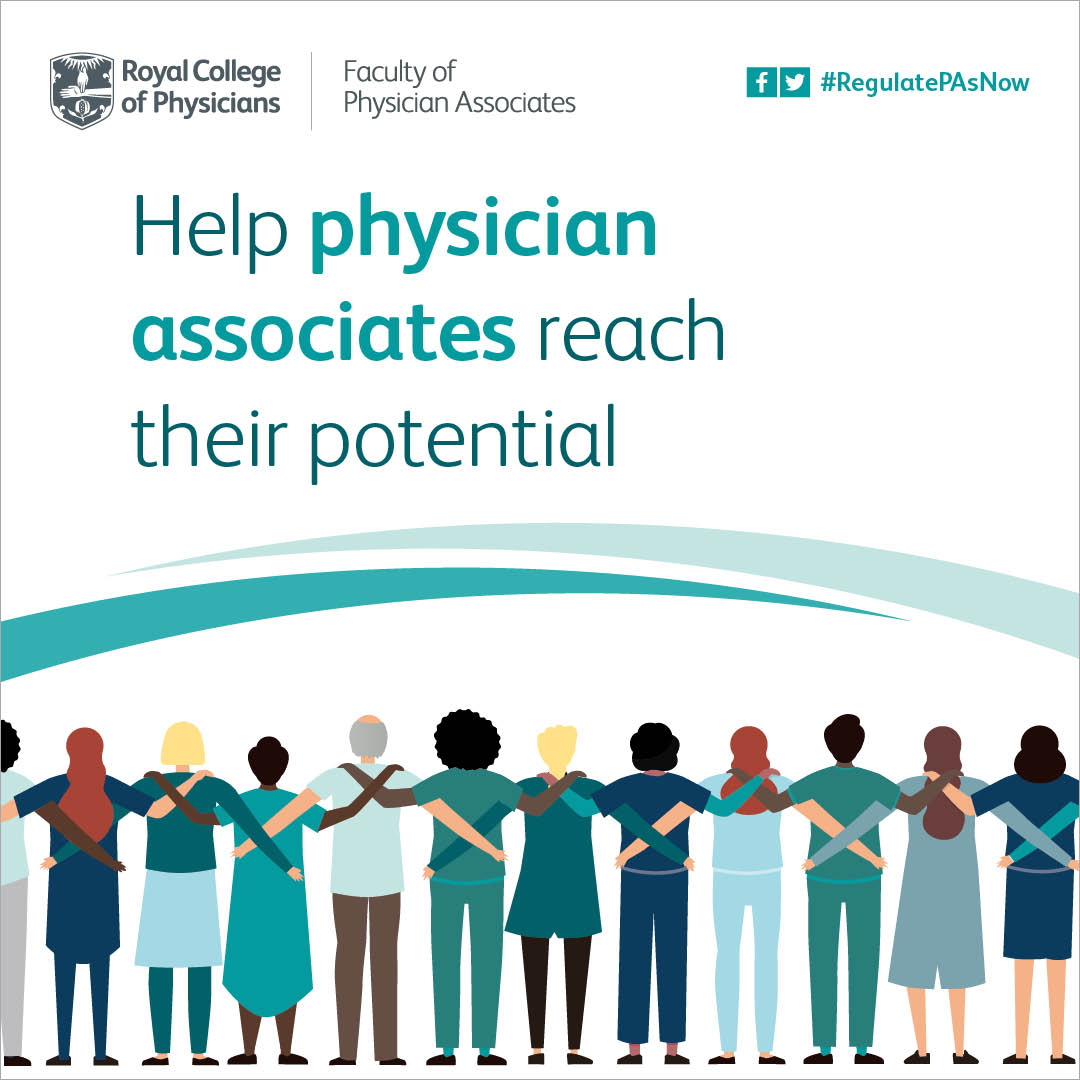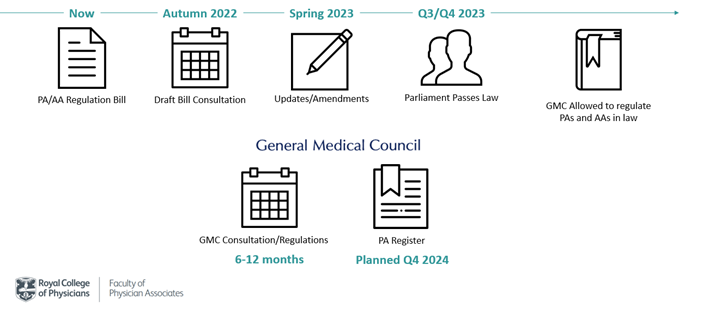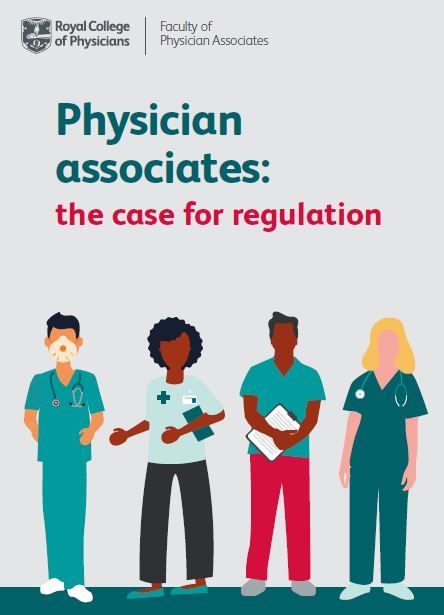#RegulatePAsNow campaign update and policy paper launched and the journey toward physician associate regulation
To keep up to date with the journey toward physician associate regulation, we advise bookmarking this page.
Last updated February 2024.
Together with The Royal College of Physicians, we recently shared the news that the Department of Health and Social Care (DHSC) has proposed a new route forward for regulating physician associates (PAs) and anaesthesia associates (AAs).
In order to avoid further delays to PA regulation, this process has now been uncoupled from ongoing wider regulatory reforms to avoid further delays to PA regulation. Given how disappointing previous delays have been, the commitment to an end date for regulation is a positive step in the journey, and we hope it will have the intended effect of delivering regulation on time.
Legislative changes are always subject to parliamentary schedules. That means that external events – such as the pandemic, can change how parliamentary time is allocated for numerous pieces of legislation a government passes in a year.
We welcome the DHSC setting out a new timetable and taking the decision to uncouple the two legislative orders, but we need to continue to remind people of the benefits of PA regulation to ensure this process doesn't lose momentum.
The more we can demonstrate the benefits of regulation and the drawbacks of not being regulated currently, the more we will show that keeping to the new timetable set out by DHSC is a crucial solution to bringing down waiting lists and easing the workforce crisis.

Today, thanks to over 300 PAs and PA students who responded to the #RegulatePAsNow survey, we are publishing a short policy paper ‘physician associates: the case for regulation'.
This will be the key publication we use to raise the profile of PA regulation with MPs once we have a new prime minister on 5 September 2022. It sets out the current barriers we experience as an unregulated profession and shows how regulation will bring official recognition of everything PAs already contribute, enable them to work at their fullest potential, and reduce delays in treatment and care.
We hope that PAs and PA employers will share the paper to emphasise the importance of the government sticking to its timeline.
Delays are disappointing, but the new approach proposed by DHSC offers hope – we now need to put our collective focus into ensuring that our government delivers it.
Update – October 2022
At the present time, the Medical Act (1983) is the law that provides the General Medical Council (GMC) to hold a register of medical practitioners, the legal name for medical doctors. At the present time, the GMC is only able to regulate doctors. In 2019 the government committed to introducing regulation for PAs, and since then the Department for Health and Social Care (DHSC) has been drafting legislation to enable the GMC to introduce statutory regulation of PAs and AAs.
In July 2022, the DHSC set out a new timetable for regulating PAs and AAs. The first step in that timetable for the introduction of this legislation is a public consultation, where members of the public can comment on draft legislation. The consultation is open for 3-months to allow sufficient time to review, analyse and respond. The government committed to opening the public consultation on AA/PA regulation in the Autumn of 2022.
Following the closure of the public consultation, the DHSC will review responses and make any necessary changes as indicated. The DHSC will then lay the AA/PA regulation legislation before the government, to pass into law. This is expected to take place in the summer of 2023. Once the law has been changed, the GMC is able to introduce regulation for PAs.
The GMC will then need to review the legislation as approved by the government and consult within the GMC about changes in the way in which the GMC operate given new laws. They will also establish how the PA register will appear, amongst other things. This is expected to need around 12 months to introduce the necessary changes within the GMC. As such, it is expected that the GMC will be able to open a register for regulating PAs towards the end of 2024.
The legislation is subject to parliamentary time. At a time of political instability, with many recent changes, the work of government and the DHSC continues to be guided by the Secretary of State for Health and Social Care, as well as other political and national issues. The FPA and RCP continue to work with the GMC, DHSC and other stakeholders to make the case that there should be no further delays in introducing PA regulation.
The below timeline illustrates the journey ahead.

Update – February 2023
On 17 February 2023, we welcomed the long called for release of the Department of Health and Social Care’s draft legislation and consultation.
To understand more about this milestone development and the next steps read our full statement.
Update – May 2023
Following the long called for publication of the Department of Health and Social Care’s (DHSC) consultation on draft legislation to bring PAs into regulation, we supported and guided FPA members and their wider support system to understand what the draft legislation meant for them, the profession and the health service.
FPA president Jamie Saunders published a regulation guidance video and hosted two-member live Q&A sessions, that invited members to submit their questions and have their concerns regarding the process answered. We encouraged all PA FPA members and their employers to submit a response to the consultation and created a guidance document to support members through this process.
We at the FPA submitted a joint response to the consultation with the RCP. Learn more about our submitted response in our joint statement.
Update – December 2023
On Monday 11 December 2023, we welcomed the publication of the Department of Health and Social Care's (DHSC) response to the above consultation. In the days following, on Wednesday 13 December 2023, the DHSC laid legislation before parliament to bring physician associates and anaesthesia associates into regulation.
Following the scrutiny and passing of the legislation, the profession will be regulated under the physician associate title, and the General Medical Council (GMC) will become the future regulator. Read our full statement in response to this development.
Update – February 2024
Following debate within the House of Commons delegated legislation committee (DLC) on Wednesday 17 January , the AAPAO passed successfully through the House of Commons on Monday 22 January . There was a debate in the Scottish parliament too, which also voted in favour.
The AAPAO was expected to be debated in the House of Lords on Tuesday 6 February. Following regret motions and a motion to decline, the debate has been rescheduled to Monday 26 February to take place in the House of Lords Chamber. The FPA welcomes the commitment and attention from parliament towards patient safety and looks forward to the future debate completing the next stage of the regulatory process. Timely introduction of regulation for physician associates is key to patient safety. Read our full statement in response to this development.

